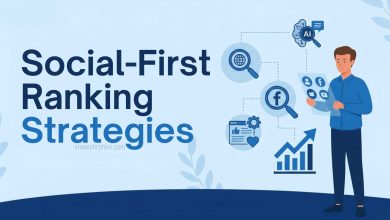What Is Conversational Marketing ? : A Comprehensive Guide for 2025
What Is Conversational Marketing : In the rapidly evolving digital marketing landscape, businesses are constantly looking for innovative ways to engage customers and drive sales. One of the most effective approaches in recent years is Conversational Marketing—a strategy that leverages real-time, two-way communication to enhance customer interactions, streamline the buyer journey, and boost conversion rates.
Table of Contents
With the rise of AI-powered chatbots, messaging platforms, and voice assistants, conversational marketing has become an essential tool for brands aiming to provide instant, personalized engagement. This guide explores the fundamentals of conversational marketing, its key benefits, implementation strategies, and the trends shaping its future in 2025.
What Is Conversational Marketing?

Conversational Marketing is a real-time, dialogue-driven approach that enables brands to connect with customers through AI chatbots, live chat, messaging apps, and voice assistants.
Also Read : Visual Search Technology : The Future of Online Search
Unlike traditional marketing techniques that rely on static content and delayed responses, conversational marketing fosters instant, dynamic interactions that guide users through the sales funnel more efficiently.
Key Features of Conversational Marketing
- Real-time communication: Enables businesses to address customer queries instantly.
- Personalized interactions: Uses data insights to tailor conversations and recommendations.
- Multi-platform integration: Works across websites, social media, WhatsApp, SMS, and other messaging platforms.
- AI-powered automation: Enhances efficiency while maintaining a human-like conversational tone.
- Data-driven insights: Helps businesses analyze customer behavior and improve engagement strategies.
Benefits of Conversational Marketing
1. Enhances Customer Experience
Conversational marketing eliminates long wait times by providing instant responses through AI chatbots and live chat, leading to a seamless customer experience.
2. Increases Engagement and Conversions
Interactive conversations keep potential customers engaged, encourage immediate action, and ultimately lead to higher conversion rates.
3. Streamlines Lead Qualification
AI chatbots can filter and qualify leads based on user responses, ensuring only high-intent prospects are directed to sales teams.
4. Reduces Customer Support Costs
Automated chatbots handle repetitive queries, reducing the need for extensive human support while ensuring consistent service quality.
5. Facilitates Omni-Channel Marketing
By integrating with multiple digital channels, conversational marketing ensures a seamless experience for customers across different platforms.
How to Implement Conversational Marketing Effectively

1. Choose the Right Conversational Tools
Select AI chatbots, live chat software, or voice assistants based on your business goals and customer preferences.
2. Optimize for Human-Like Conversations
Use Natural Language Processing (NLP) to make AI chatbots sound more natural and engaging.
3. Personalize Customer Interactions
Leverage customer data to provide tailored responses and product recommendations.
4. Integrate with CRM and Marketing Automation
Connecting chatbots with CRM systems allows for better data management and personalized follow-ups.
5. Enable Multi-Channel Messaging
Ensure customers can interact with your brand via different platforms, including WhatsApp, Facebook Messenger, and Instagram.
6. Monitor Performance and Optimize
Regularly analyze chatbot interactions, customer feedback, and conversion data to refine your strategy.
Future Trends in Conversational Marketing (2025 and Beyond)
1. AI-Powered Voice Assistants
With the rise of smart speakers and voice search, businesses will leverage voice assistants to provide hands-free customer support.
2. Hyper-Personalization
Advanced AI will deliver ultra-personalized recommendations and responses based on user preferences and behavior.
3. Conversational Commerce
E-commerce brands will integrate chatbots into online stores, allowing customers to browse and purchase products via chat.
4. Augmented Reality (AR) and Virtual Reality (VR) Integration
Conversational AI will merge with AR/VR to create immersive shopping and customer support experiences.
5. Proactive Chatbots
AI-powered chatbots will not only respond to queries but will also anticipate customer needs and offer solutions before being asked.
6. Enhanced Data Security and Compliance
With increasing concerns about data privacy, businesses will implement stricter security measures to protect customer information.
What Is Conversational Marketing – Conclusion

Conversational marketing is revolutionizing how businesses interact with customers by fostering real-time, personalized engagement. As AI and automation continue to evolve, brands that adopt and optimize conversational marketing will gain a competitive advantage in 2025 and beyond.
Buy Now : Digital Marketing E-Book
By leveraging AI chatbots, multi-channel messaging, and data-driven personalization, businesses can drive higher engagement, improve customer satisfaction, and accelerate growth.
Keywords: Conversational Marketing, AI Chatbots, Digital Marketing Trends 2025, Customer Engagement, Personalization, Live Chat, Lead Generation, Voice Search Optimization, Multi-Channel Marketing, Automated Customer Support, Conversational AI, Chatbot Integration, Messaging Apps Marketing, AI-driven Marketing Strategies.



